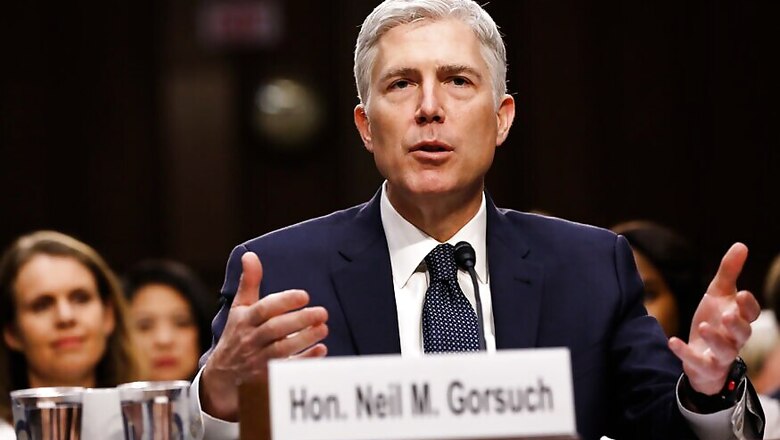
views
Washington: US Senate Republicans and Democrats clashed bitterly over President Donald Trump's Supreme Court pick, with no signs that a potentially damaging on Thursday showdown will be averted.
The Senate began formal debate Tuesday on federal Judge Neil Gorsuch, as opposition Democrats insisted they have the necessary votes to block his nomination through use of a tactic known as a filibuster.
Sixty votes are needed to overcome a filibuster and end debate in the 100-seat Senate. Republicans hold 52 seats.
A confirmation vote follows on Friday, after which Congress shutters for a two-week recess.
The expected failure of the test vote sets the stage for Republican leaders to employ the "nuclear option," which would change Senate rules in order to advance the nomination -- and all subsequent Supreme Court nominees -- by a simple majority vote.
McConnell warned that the Democrats' filibuster could do something "truly detrimental to this body and to our country."
Democrats were "hurtling toward the abyss," he said, "and trying to take the Senate with them. They need to reconsider."
To date, just four Democrats have announced their support.
"They're pretty much dug in," Republican Senator John Thune said of Democratic colleagues.
McConnell will need to put the rules change to a majority vote. He said he has enough votes from his party for the change to succeed, but some Republicans have bristled at the nuclear option and how the threat of using it has poisoned the atmosphere.
Senator John McCain fumed to reporters that whoever thought it was a good idea to blow up longstanding Senate rules "is a stupid idiot."
"Republicans aren't going to be played for suckers and chumps," Cotton said on the Senate floor.
Lawmakers from both parties have observed that the nuclear option will lead to fewer consensus Supreme Court nominees and more fringe justices.
"This fallout will be dangerously and perhaps disastrously radioactive for the Senate in years to come," Democrat Richard Blumenthal said.
But there were no apparent signs of a deal to avoid the filibuster, or the nuclear option.
Top Democrat Chuck Schumer pointed to McConnell's refusal to hold hearings or a vote on Merrick Garland, whom then-president Barack Obama had tapped to replace Scalia.
When Trump won November's presidential election, the Garland nomination was dead, infuriating Democrats.
"We lost one, they lost one," Schumer said.



















Comments
0 comment